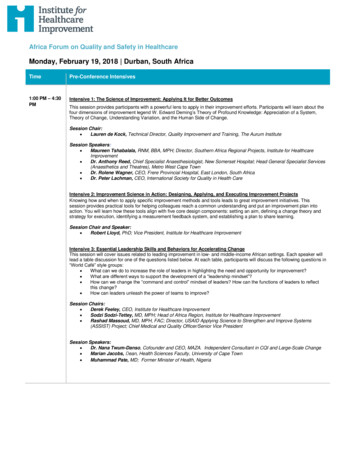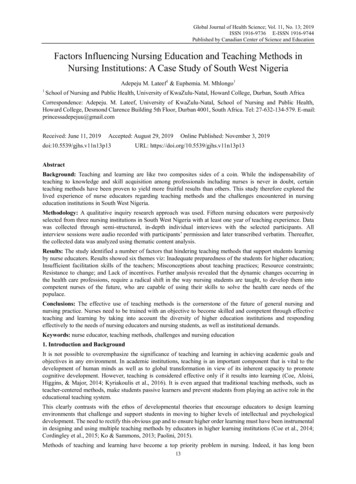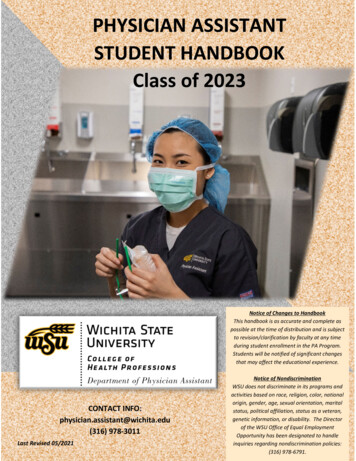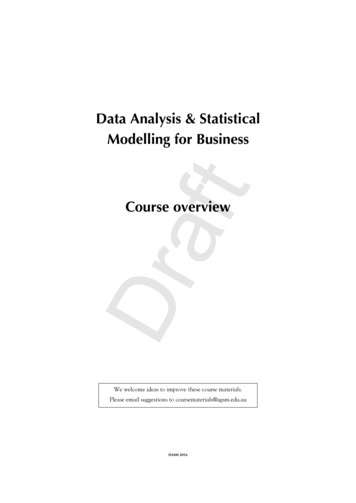
Transcription
Africa Forum on Quality and Safety in HealthcareMonday, February 19, 2018 Durban, South AfricaTimePre-Conference Intensives1:00 PM – 4:30PMIntensive 1: The Science of Improvement: Applying It for Better OutcomesThis session provides participants with a powerful lens to apply in their improvement efforts. Participants will learn about thefour dimensions of improvement legend W. Edward Deming’s Theory of Profound Knowledge: Appreciation of a System,Theory of Change, Understanding Variation, and the Human Side of Change.Session Chair: Lauren de Kock, Technical Director, Quality Improvement and Training, The Aurum InstituteSession Speakers: Maureen Tshabalala, RNM, BBA, MPH; Director, Southern Africa Regional Projects, Institute for HealthcareImprovement Dr. Anthony Reed, Chief Specialist Anaesthesiologist, New Somerset Hospital; Head General Specialist Services(Anaesthetics and Theatres), Metro West Cape Town Dr. Rolene Wagner, CEO, Frere Provincial Hospital, East London, South Africa Dr. Peter Lachman, CEO, International Society for Quality in Health CareIntensive 2: Improvement Science in Action: Designing, Applying, and Executing Improvement ProjectsKnowing how and when to apply specific improvement methods and tools leads to great improvement initiatives. Thissession provides practical tools for helping colleagues reach a common understanding and put an improvement plan intoaction. You will learn how these tools align with five core design components: setting an aim, defining a change theory andstrategy for execution, identifying a measurement feedback system, and establishing a plan to share learning.Session Chair and Speaker: Robert Lloyd, PhD; Vice President, Institute for Healthcare ImprovementIntensive 3: Essential Leadership Skills and Behaviors for Accelerating ChangeThis session will cover issues related to leading improvement in low- and middle-income African settings. Each speaker willlead a table discussion for one of the questions listed below. At each table, participants will discuss the following questions in“World Café” style groups: What can we do to increase the role of leaders in highlighting the need and opportunity for improvement? What are different ways to support the development of a “leadership mindset”? How can we change the “command and control” mindset of leaders? How can the functions of leaders to reflectthis change? How can leaders unleash the power of teams to improve?Session Chairs: Derek Feeley, CEO, Institute for Healthcare Improvement Sodzi Sodzi-Tettey, MD, MPH; Head of Africa Region, Institute for Healthcare Improvement Rashad Massoud, MD, MPH, FAC; Director, USAID Applying Science to Strengthen and Improve Systems(ASSIST) Project; Chief Medical and Quality Officer/Senior Vice PresidentSession Speakers: Dr. Nana Twum-Danso, Cofounder and CEO, MAZA. Independent Consultant in CQI and Large-Scale Change Marian Jacobs, Dean, Health Sciences Faculty, University of Cape Town Muhammad Pate, MD; Former Minister of Health, Nigeria
Africa Forum on Quality and Safety in HealthcareTuesday, February 20, 2018 Durban, South AfricaTimeGeneral Conference Day 18:00 – 9:00 AMRegistration and Coffee9:00 – 10:00 AMOpening Ceremony and Keynote 1 Aaron Motsoaledi, Minister of Health of South Africa10:00 – 10:30 AMBreak10:30 – 12:00 PMWorkshops Session AA1: Better Quality Through Better MeasurementThis workshop applies a hands-on approach to introduce you tothe tools and methods to develop and implement a strongmeasurement strategy for your quality improvement projects.Lessons for developing a family of measures, operationaldefinitions, and a data collection and analysis plan and for usingrun charts to look at data over time will be shared.Session Speakers and Co-Chairs Robert Lloyd, PhD; Vice President, Institute forHealthcare Improvement Dr. Nana Twum-Danso, Cofounder and CEO, MAZA.Independent Consultant in CQI and Large-ScaleChange”A2: Overcoming Critical Health System Gaps: The Role ofManagement in Continuous ImprovementLeadership and Team Work are at the center of successful qualityimprovement programs. How do managers motivate their teamsto go an extra mile in providing quality of care? How do theymanage staff turnover in sustaining the gains in continuousquality improvement? This panel discussion will critically focus onpractical measures being used to manage critical health systemgaps affecting the quality of care in Low and Middle-IncomeCountriesSession Chair: Andrew Likaka, MD; Director, Quality ManagementDirectorate, Ministry of Health, MalawiSession Speakers: Benjamin Nyakutsey, Head, Policy Analysis Unit,Ministry of Health, Ghana Address Mauakowa Malata, PhD, MScN; Deputy ViceChancellor of the Malawi University of Sciences andLeadership Summit10:30 AM ‒ 4:30 PMHow can leaders and managerseffectively direct large-scale change?How do we move from visionarystatements and policy to high impactinitiatives implemented at national,regional, district and facility level?Using IHI’s frameworks for organizingand implementing a national qualitystrategy and high impact leadership, theLeadership Summit at IHI’s First AnnualForum will aim to answer thesechallenging questions while providingcontent that is applicable to a variety ofleaders including policy makers, CEOs,district managers, government anddepartmental. The session will usemultiple formats including frameworkpresentations, illustrative case studies,and small group discussions to explorethese leadership and managementtopics
Technology, Malawi; Vice President of the InternationalConfederation of MidwivesA3: Cutting-edge Maternal, Newborn, and Child HealthProgramming from Across AfricaThis session will review common quality gaps in maternal,newborn, and child health (MNCH) in Africa and examples ofcutting-edge programming that is driving improvement.Presentations will describe the application of improvementmethods in local health care systems to improve and sustainhigh-impact routine and complications care across the life-cycle:for newborns, children, adolescent girls, and women. Therelevance of key Forum themes, such as leadership,measurement, improvement capability, people-centered care, andsafety and reliability will be explored in regard to thesepopulations. The session will reference global, regional, and localMNCH quality-focused initiatives and learning platforms that canhelp accelerate MNCH improvement work in Africa, including theWHO Quality Equity and Dignity network.Session Chair: Kathleen Hill, Maternal Health Team Lead, Maternaland Child Survival Program, USAIDSession Speakers: James Duah, MD, MPH, EMBA; Deputy ExecutiveDirectorChristian Health Association of Ghana (CHAG Hema Magge, MD; Country Director, Ethiopia, Institutefor Healthcare Improvement Monica Okuga, Research Fellow/ Project CoordinatorMakerere University School of Public Health Richard Kagimu, Improvement Coordinator USAIDASSIST, University Research Company Kampala,Uganda Dr. Ugo Okoli, Deputy Director USAID Maternal ChildSurvival program in Nigeria; Deputy Country Director,Jhpiego Nigeria10:30 -12:00PMORAL POSTER SESSION: Health System StrengtheningRapid fire poster presentations aimed at demonstrating theimportant work taking place on the ground throughout AfricaSession Chair: Dr. Peter Barron, SA National Department of HealthTechnical Assistant12:00 ‒ 1:00 PMLunch
1:00 ‒ 2:30 PMWorkshops Session BB1: Coaching for Improvement: Unleashing Employee PotentialHealth care professionals are intuitively compelled to provide the best quality of care theycan offer their patients — but quality improvement is a learned skill. Coaching will unleashhealth workers’ inherent potential to improve the quality of care they provide. Although theavailability of resources can be a limiting factor in achieving desired outcomes, having a‘quality’ mindset and applying the tools of improvement can help initiate, establish, andsustain improvement interventions to optimize the resources you have.Session Chair: Dr. Gilbert Buckle, CEO, Korle Bu Teaching HospitalSession Speaker: Cindy Muthukarapan, Master Certified Coach,(MCC), International CoachFederationB2: Is Patient-Centered Care and Patient Engagement ‘Icing on the Cake’ or anEssential Ingredient?Designed with the patient at the center, this session brings together seasoned andpassionate speakers – including patients – as they share experiences, practical strategies,work impact and challenges. Their stories will span across work in multiple Africancountries, for different streams of patients, using different methodologies and forums, andfrom different walks of life. Participants will have the opportunity to ask related burningquestions and be part of a vibrant interactive session. At the end of this session, eachparticipant will be equipped to think differently and innovatively on how to move from‘talking the talk to walking the walk’ in making clear actionable steps to delivering patientcentered care and patient engagement in the work that they do.Session Chair: Kendra Njoku, Faculty and Improvement Advisor, Institute for HealthcareImprovementSession Speakers: Dr. Sefakor Enam Bankas, Founder, Sickle Life Dr. Orode Doherty, Country Director, Africare Xoliswa Nxiba, Patient/Counsellor,ARV Adherence Club Abiyou Kiflie, MD; IHI Deputy Country Director, Ethiopia Mengistu Gebremichael, M.Sc.N, PhD Fellow; Assistant Professor, MekelleUniversityB3: HIV and TB Success StoriesThe burden of infectious diseases, particularly HIV and TB, remains high, even as progressis being made to slow both mortality and new infections. Over 25 million adults and childrenare living with HIV in Africa, with over 19 million in Eastern and Southern Africa (2016;UNAIDS), with over 700,000 deaths occurring in 2016 attributable to HIV. In 2015, 2.7million new TB cases were diagnosed with nearly 25% of those cases resulting in death. Todeliver effective and appropriate care to people with HIV and TB, health systems need tobe able to not only address acute manifestations of illness, but also their impact oncommunity health. With the benefits of treatment allowing people living with HIV (PLWH) toenjoy a full lifespan, their chronic care needs consisting of lifelong treatment andmanagement of other diseases require robust systems that offer comprehensive primarycare while simultaneously providing effective quality HIV care as well. To meet thesechallenges, many improvement initiatives have been implemented to scale-up care thatdelivers desired outcomes, while preventing further transmission. Examples from acrossAfrica that demonstrate effective implementation or effectiveness of improvementLeadershipSummit
interventions to deliver excellent care while scaling up systems to maintain quality will bepresented in this workshop.Session Chair: Bruce Agins, MD; Director at HEALTHQUAL International and Medical Director,New York State Department of Health AIDS InstituteSession Speakers: Mercy Jere Makwakwa, MBBS; Program Manager - Facility Interventions,MaiKhanda Trust, Blessing Mutede, MD; Senior Technical Advisor- Program Quality Improvementat EGPAF (Elizabeth Glaser Pediatric AIDS Foundation)-Zimbabwe Maureen Tshabalala, RNM, BBA, MPH; Director, Southern Africa RegionalProjects, Institute for Healthcare Improvement Apollo Basenero, MD; Chief Medical Officer, Quality Management Program,Quality Assurance Division; Ministry of Health and Social Services; Namibia Samson Haumba, Country Director, University Research Co., LLC-Swaziland Esther Karamagi Nkolo, Chief of Party at University Research Co., LLC (URC)& Center for Human Services1:00-2:30 PMPractical Skills Building Session: Teaching Dignity, Respect and Communication Hema Magge, MD; Country Director, Ethiopia, Institute for HealthcareImprovementAbiyou Kiflie, MD; IHI Deputy Country Director, EthiopiaNeil Prose, MD, Duke University Medical Center2:30 ‒ 3:00 PMBreak and Coffee3:00 ‒ 4:15 PMWorkshops Session CC1: Building an Integrated Approach to Lean, Six Sigma, and the Model forImprovement in AfricaWhat approach to quality improvement does your organization follow? Lean? Six Sigma?The Model for Improvement? All have value and yet many organizations send mixedmessages to their employees, lacking what Deming called “constancy of purpose.” Someorganizations claim they are following one approach this month then state that anotherapproach will be used next month. This workshop will help participants clarify thesimilarities and differences between the three approaches and provide a framework fororganizing their overall quality improvement strategy.Session Chair: Pierre Barker, MB, ChB, MD; Chief Global Partnerships and Programs Officer,Institute for Healthcare ImprovementSession Speaker: Dr. Emmanuel Aiyenigba, Faculty, Institute for Healthcare Improvement Rohit Ramaswamy, PhD, MPH; Clinical Associate Professor, Public HealthLeadership Program and Maternal and Child HealthC2: Infectious Disease Prevention and ManagementThe growing risk of antimicrobial resistance (AMR) has significantly elevated globalleadership commitment to infectious disease prevention and management and highlightedthe importance of antimicrobial stewardship. It is increasingly recognized that common andLeadershipSummit
life-threatening infections like pneumonia and post-operative infections, as well as HIV,tuberculosis and malaria are at risk of becoming untreatable because of AMR. Swift,effective, lifesaving actions are needed across the human, animal and environmentalhealth sectors in this field. In this session we will explore experience in African countries ofapplying Quality Improvement to address health systems challenges in the field ofinfectious disease prevention and management and antimicrobial stewardship.Session Chair: Dena Van Den Berg, Director of Quality Leadership at NetcareSession Speakers: Dr Jesse Werner, Public Health Medicine Registrar: UCT; Western CapeGovernment: Department of Health Angeliki Messina, Quality Systems and Innovation Manager, Netcare Ltd andHonorary Lecturer in Pharmacy, University of Witwatersrand Prof Natalie Schellack, Associate Professor/Acting Head of the Division ofClinical Pharmacy, School of Pharmacy, Sefako Makgatho Health SciencesUniversity Bart Willems,C3: Primary Care and NCDsPrimary care, including non-communicable diseases (NCDs) such as cancer, diabetes,cardiovascular disease, chronic lung disease, mental illness, and surgical care,have often been considered a ‘luxury’ of middle and high-income countries, orsomething that can only be prioritized after addressing infectious disease.However, of the 56.4 million global deaths in 2015, 70% were due to NCDs, witha disproportionate proportion – over 75%- occurring in low- and middle-incomecountries. To meet this need, all countries must consider how to develop robustsystems of care that can deliver high quality care for basic and complex illnessesto all. As many countries across Africa are moving towards the goal of UniversalHealth Coverage as part of the Sustainable Development Goals, policy makersand health care workers are faced with establishing and integrating services forchronic diseases and converting vertical care platforms into horizontal systems ofprimary care delivery. This session will explore how to integrate quality of careinto these “new” service areas. Should building blocks be established first andthen examine quality of care? Or is there a way to incorporate quality planning,management and improvement principles from the start? We will learn fromimplementers and national-level experts how to deliver on the goal of high-qualitycare for allSession Chair: Hema Magge, MD; Country Director, Ethiopia, Institute for HealthcareImprovementSession Speaker: Jenny Edge, MD; Christiaan Barnard Memorial Hospital, Cape Town Neo Tapela, MD, MPH, Head of Non- communicable Diseases, BotswanaMinistry of Health and Wellness .Research Associate, Botswana HarvardPartnership Julie Makani, Welcome Trust Research Fellow and Associate Professor,Department of Haematology and Blood Transfusion, Muhimbili University ofHealth and Allied Sciences Lisa Hirschhorn, MD, MPH; Professor, Medical Social Sciences, FeinbergSchool of Medicine, Northwestern University
3:00-4:15PMORAL POSTER SESSION: TB/HIVRapid fire poster presentations aimed at demonstrating the important work taking place onthe ground throughout AfricaSession Chair: Lindiwe Mvusi, MD, Director - TB Control and Management3:00-4:15PMPractical Skills Building Session: Run Charts Robert Lloyd, PhD; Vice President, Institute for Healthcare Improvement4:15 – 4:30 PMTransition to Keynote4:30 – 5:30 PMKeynote 2: Vuyiseka Dubula, Director of the Africa Centre for HIV/AIDs Management atStellenbosch University
1st Annual Africa Forum on Quality and Safety in HealthcareWednesday, February 21, 2018 Durban, South AfricaTimeGeneral Conference Day 28:00 ‒ 9:00 AMRegistration and Breakfast9:00 ‒ 10:00 AMKeynote 3 Muhammad Pate, MD, MBA; Former Minister of Health, Nigeria Don Berwick, MD; President Emeritus, Senior Fellow, Institute for Healthcare Improvement10:00 – 10:30 AMBreak and Coffee10:30 – 12:00 PMWorkshops Session DD1: Integrating Quality into Health System StrengtheningShowcasing Dr. Muhammad Pate’s hands on experience in transforming Nigeria’s health care system as Minister ofHealth, this session will demonstrate how to successfully integrate quality improvement system wide. Relyingon case studies proven methods, this session will provide attendees with reliable action items to back andapply to their own organizations and systems.Session Chair: Muhammad Pate, MD, MBA; Former Minister of Health, NigeriaSession Speaker: Neo Masike, Programme Manager, The Aurum InstituteD2: Patient Safety and ReliabilityThis session will demonstrate how to effectively engage leaders, managers, physicians and front-line teams in theculture of patient safety and reliability and how simple strategies can measurably impact culture andoutcomes across your organization.Session Chair: Dr Neelam Dhingra, Coordinator for the Patient Safety and Quality Improvement Unit, Service Delivery andSafety Department, World Health OrganizationSession Speaker: Derek Feeley, CEO, Institute for Healthcare ImprovementD3: Equity and Justice: The Underpinning of Quality in Every Health SystemImproving health and health care worldwide requires a focus on equity. This includes equitable access to patientcentered quality care able to reach the most marginalized segments of a population. This session will identifystrategies for building will to achieve health equity. Applying lessons from case studies and real life successstories, this session will help you build and design an approach tailored to your setting.Session Chair: Dr. Yogan Pillay, Deputy Director-General for HIV/AIDS; TB; and Maternal, Child, and Women’s Health inthe National Department of Health, South Africa.D4: ‘Is Technology Really Just an Enabler of Quality Health Care Delivery?’:
The Role of Digital Platforms in Transforming the Health Care Landscape of AfricaTechnology is often acknowledged as having immense transformative potential in driving health system improvementin Africa. Is it true that technology can only serve as an enabler of health care quality improvement? While dramaticinnovations in technology abound in Africa, and in the context of rapidly growing mobile phone penetration, this sessionwill explore how technology is being used to drive improvement in a myriad of contexts and countries in Africa.Speakers will also explore what it takes for technology to be a critical driver of quality of care.Session Chair: Dr. Nneka Mobisson, mDoc, CEOSession Speakers: Dr. Peter Barron, SA National Department of Health-Technical Assistant Nicole Spieker, Pharmaccess Foundation Alice Liu, Director of ICT4D, Jhpiego Simbarashe Mpariwa, Clinical Mentor, Ministry of Health and Social Services10:30-12:00PMORAL POSTER SESSION: Maternal and Newborn HealthRapid fire poster presentations aimed at demonstrating the important work taking place on the ground throughoutAfricaSession Chair: Mirwais Rahimzai, Regional Director- East Africa, USAID ASSIST10:30-12:00PMPractical Skills Building Session: Control Charts Robert Lloyd, PhD; Vice President, Institute for Healthcare ImprovementErnest Kanyoke, MSc; Executive Director, Ubora Institute, Ghana12:00 – 1:00 PMLunch1:00 – 2:00 PMWorkshops Session EE1: The Role of Accreditation in Measurable Improvements in QualityAccreditation is a fundamental part of the quality and safety process. Famed improvement scientist Joseph Juranindicated the need for quality planning, management, and control to move to continual quality improvement. In thissession, we will examine the rationale for the accreditation of health care services against accepted standards andexplore how organizations can continually improve the requirements of statutory bodies. Note: This will be aninteractive session with case studies.Session Chair: Dr. Peter Lachman, CEO, International Society for Quality in Health CareSession Speakers: Nicole Spieker, Pharmaccess Foundation Jacqui Stewart, CEO, COHSASAE2: The Caring ConversationThe 90 minute session will be conducted as a conversation in which each of the participants will share theirexperiences of the spaces in which they give care to patients, carers and communities, and in which they find ways ofreceiving care for themselves. In this engagement, they will seek intersections towards further opportunities forintervention after the conference.
Session Chair: Marian Jacobs, Dean, Health Sciences Faculty, University of Cape TownSession Speakers: Steve Reid, PhD; Professor of Primary Health Care, University of Cape Town Marc Hendrics, MBChB(UCT), DIP PEC(SA), DCH(SA), FCPaed(SA), CMOPaed(SA), PaediatricOncologists, Senior Specialist, Haematology Oncology Service, Red Cross War Memorial Children’sHospital, Cape Town, South Africa Deborah Lee Miller, MBChB UCT 1987, DCH (eng) Dip Pall Care UCT, MPhil Pall Care UCT, GeneralPractitioner, Part time lecturer Pall Care UCT Itumeleng Ntatamala, Founder of the Future Health Leaders Programme, Former chairperson of the RuralSupport Network Johann Van Greunen, Cape TownE3: Resilient Health Systems: Managing Health System CrisisThe world continues to be faced with crisis after crisis; both natural and man-made with almost equal scope andseverity. With financial cost to anticipate, prevent and manage HS crisis that could run into billions of dollars, the needfor building and/or strengthening public-private partnership; including academic and research institutions, cannot beover-emphasized. From our history in Africa, we must begin to meet each crisis with our minds fixed on ‘crisispreparedness’, which includes Regional support teams just like a sort of ‘crisis surge registry’ of competent cadres ofresponders from various disciplines that are trained in a customized context-appropriate framework that focuses onimproving countries, crises preparednessSession Chair: Garfee Williams, MD, MPH; Deputy Chief of Party, Collaborative Support for Health Program, Monrovia,LiberiaSession Speaker: Don Berwick, MD; President Emeritus, Senior Fellow, Institute for Healthcare ImprovementE4: TB/HIVSession Chair: Zameer Bray, TB Program Lead South Africa at Bill & Melinda Gates FoundationSession Speakers: Lindiwe Mvusi, MD, Director - TB Control and Management Madhukar Pai, MD, PhD, FCAHS; Director, McGill Global Health Programs Michele Youngleson, Healthcare Systems Improvement Advisor Nneka Onuaguluchi, MD; Quality Improvement Advisor, Management Sciences for Health,2:00 – 2:15 PMBreak and Transition to Keynote2:15 – 3:30 PMKeynote 4 and Closing Ceremony Sodzi Sodzi-Tettey, MD, MPH; Head of Africa Region, Institute for Healthcare Improvement
Africa Forum on Quality and Safety in Healthcare Tuesday, February 20, 2018 Durban, South Africa Time General Conference Day 1 8:00 - 9:00 AM Registration and Coffee 9:00 - 10:00 AM Opening Ceremony and Keynote 1 Aaron Motsoaledi, Minister of Health of South Africa 10:00 - 10:30 AM Break 10:30 - 12:00 PM Healthcare Improvement










